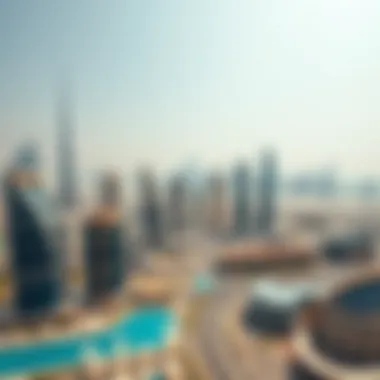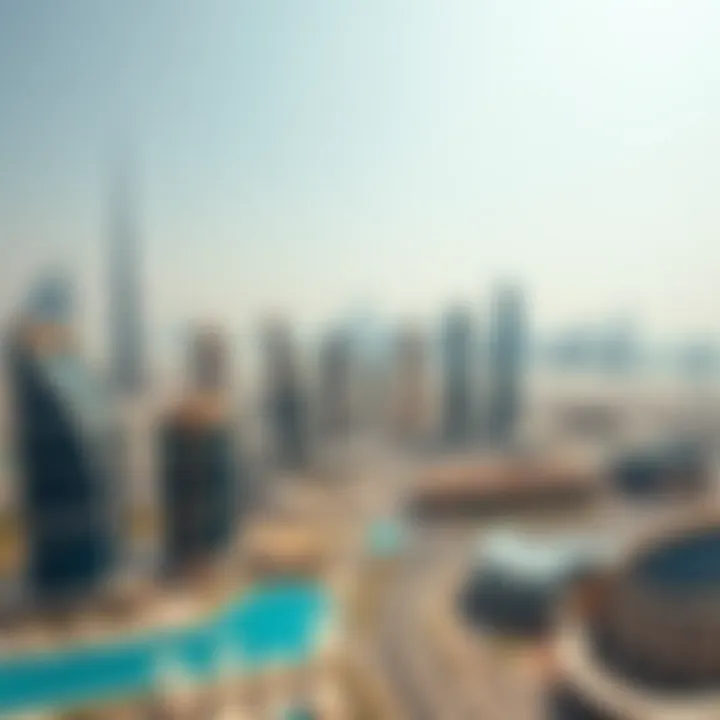Understanding 20 Million Dirhams in Dubai Real Estate


Intro
Investing a substantial amount in real estate, particularly 20 million dirhams in the vibrant market of Dubai, is not a decision taken lightly. This figure represents a significant financial threshold that can open the door to luxurious properties, prime locations, and the potential for substantial returns. Given the rapid evolution of Dubai's skyline and its ongoing development projects, understanding the implications of such an investment becomes paramount for buyers, sellers, and real estate professionals alike.
The allure of the Dubai real estate market lies not only in its opulence but also in the diverse opportunities it presents. From strategically located penthouses with stunning views of the Burj Khalifa to sprawling villas nestled within the serene communities of Emirates Hills, the options are plentiful. However, potential investors need to be savvy, as this market, while promising, comes with its set of challenges and peculiarities.
As we delve deeper into this article, we will unpack the motivations behind investing at this level, analyze the current market trends, and explore the broader socio-economic impacts of such financial commitments. By providing these insights, we aim to equip you with the knowledge to navigate the complex waters of Dubai's real estate landscape effectively.
Understanding the Million Dirhams Benchmark
The increasing prominence of 20 million dirhams as a benchmark in Dubai's real estate sector signals more than just numbers; it captures the very essence of luxury and investment potential in this bustling metropolis. This figure stands as a threshold for high-end property transactions, making it a focal point for discerning investors and affluent homebuyers looking to stake their claims in a market that offers both prestige and opportunity.
To appreciate the depth of this benchmark, it is essential to recognize that Dubai's property landscape has undergone remarkable transformations over the years. From the initial stages of sky-high aspirations fueled by innovative architecture and wealthy expatriates to the rapid expansion of luxury developments, property values have witnessed a staggering ascension. Here, a 20 million dirham investment not only denotes financial commitment but also implies a strategic positioning within the luxury segment of the market.
The Evolution of Property Values in Dubai
Property values in Dubai have not climbed a smooth path; rather, they reflect a series of peaks and valleys that capture the essence of global economic variables, shifts in demand, and investor sentiment.
In the early 2000s, the market saw the birth of stunning skyscrapers such as Burj Khalifa, planting the seeds for high-value transactions. Fast forward to a decade later, these kinds of properties began attracting global attention, seen as covetable assets among high-net-worth individuals. The 20 million dirham threshold emerged as symbolic of not only affluence but also stability of investment, undergone by rising expatriate populations and savvy investors from around the globe.
In recent years, the government has launched various initiatives aimed at enhancing market appeal, such as offering long-term residency visas for property owners. This pushed the envelope even further, driving values upward and solidifying the 20 million dirham benchmark. Whether it’s the iconic Palm Jumeirah or the serene enclaves of Emirates Hills, properties priced at this level invite more than just ownership; they beckon a lifestyle that harmonizes luxury, comfort, and a touch of exclusivity.
Implications of High-Value Transactions
The transition to high-value transactions carries a weight of implications that ripple through various layers of the economy. First and foremost, when properties fetch prices in the realm of 20 million dirhams, the surrounding infrastructure and amenities often see a corresponding uplift. It’s not merely about the property itself; it’s about the lifestyle it promotes and the community it enriches.
Investors stepping into this echelon often anticipate capital appreciation, bolstered by high demand and limited supply. This begs the question of liquidity and ease of resale, which can be particularly appealing for those looking to capitalize on their investments in the long run. However, it's also essential to navigate the complexities such as fluctuating market conditions and regulatory frameworks that any investor should be cognizant of.
Furthermore, the prevalence of these transactions affects the segments below it, creating a trickle-down effect that can elevate property values across the board. Homebuyers and investors at lower price points may find themselves priced out, reshaping the demographic composition of various neighborhoods.
In summary, the 20 million dirhams benchmark is not just a figure; it is a linchpin of Dubai's real estate economy, representing opportunities, risks, and a glimpse into the vibrant lifestyle that the city encapsulates. This transition reveals trends poised to reshape investment strategies, and understanding its implications is crucial for those looking to make informed decisions in a fluid market.
Investment Trends in Dubai Real Estate
In recent years, the Dubai real estate landscape has witnessed transformative shifts, and understanding these trends on a deeper level is crucial for investors and stakeholders alike. The segment of the market catering to those with substantial financial clout—especially around the 20 million dirhams mark—offers rich opportunities as well as unique challenges that need careful consideration.
High-value transactions often attract attention, signaling the economic health of the region and providing insight into buyer behavior. Investors typically seek properties that promise both aesthetic appeal and strong returns, emphasizing the importance of grasping current investment trends.
Luxury Market Dynamics
The luxury market in Dubai is akin to a bustling bazaar, where each property holds a unique narrative and a tantalizing draw for affluent buyers. Properties at the 20-million-dirham threshold often find their way into the portfolios of high-net-worth individuals seeking not just a home, but a foothold in one of the most vibrant cities in the world.
Over the past years, there has been a marked surge in the development of opulent residences, especially in prime locations such as the Palm Jumeirah and Downtown Dubai. This shift correlates with global wealth patterns, where a growing number of billionaires are eyeing Dubai as a desirable locale due to its safety, favorable tax regime, and luxurious lifestyle.
Key drivers in this luxury segment include:
- Amenities: Buyers expect state-of-the-art features like private pools, gym facilities, and concierge services.
- Design Prestige: Renowned architects and designers are often commissioned, ensuring properties are not just homes, but also architectural masterpieces.
- Sustainability Practices: There's a growing emphasis on environmentally-friendly designs, appealing to a socially conscious clientele.
This segment is likely to continue flourishing as long as the factors that make Dubai irresistible remain intact.
"Dubai's reputation as a luxury haven is not just about opulence; it’s a carefully curated experience that appeals to the desire for both exclusivity and community."
Emerging Neighborhoods Worth Noting
Beyond the well-trodden paths of luxury real estate, several emerging neighborhoods are gaining traction among savvy investors. Areas like Dubai Hills Estate and Dubai Creek Harbour are establishing themselves not just as alternatives but as sterling options that promise growth and potential appreciation.
- Dubai Hills Estate:
- Dubai Creek Harbour:
- Offers a blend of modern developments and green spaces, appealing to families.
- Features properties ranging from lavish villas to stylish apartments, making it versatile for different budgets.
- Positioned as a competitor to Downtown, this area is characterized by stunning waterfront views and sustainable living spaces.
- The anticipation of the completion of the Dubai Creek Tower adds to its allure, positioning it as a future hotspot.
Investing in these burgeoning areas not only diversifies an investment portfolio but also positions buyers at the cusp of rapid growth and development. As the urban landscape of Dubai evolves, knowing where to plant seeds for future gains is essential.
Most importantly, potential investors must keep their ears to the ground, monitoring changes in infrastructure, amenities, and community developments. These small shifts can echo loudly in terms of property values and overall desirability in the ever-competitive real estate space.
Why Invest Million Dirhams?


Investing a significant amount like 20 million dirhams in Dubai's real estate market opens a myriad of avenues for both seasoned investors and first-time buyers. It’s like dipping your toes into a pool that’s not only luxurious but also brimming with possibilities. This financial threshold is not arbitrary; it serves as a benchmark that can indicate sound investment decisions, while also presenting unique opportunities and challenges within the bustling real estate landscape.
With Dubai remaining one of the world’s hotspots for real estate investment, understanding the nuances behind this figure becomes crucial. The implications of committing to a lavish property can affect one’s financial portfolio, lifestyle choices, and even long-term economic strategies. Whether one is looking to secure a residence, generate rental income, or diversify their investment portfolio, the stakes are high and the benefits can be substantial.
Strategic Advantages of High Investments
Investing 20 million dirhams can be viewed through various lenses, each revealing strategic advantages. For starters, high-value investments tend to command a certain level of prestige. Properties in this price range often come with amenities that are a cut above the rest—think lavish facilities, prime locations, and breathtaking architectural designs.
Also, properties in this category often see increased appreciation in value over time. Dubai has a thriving luxury market that attracts a global clientele which could pave the way for significant returns. High-value investments typically indicate a stable market condition, which is particularly appealing to seasoned investors looking for less volatile options.
Here are some benefits that come with making such a substantial investment:
- Prestigious Addresses: Properties located in sought-after areas like Palm Jumeirah or Downtown Dubai can elevate both the investor's social standing and their investment's worth.
- Tailored Services: High-end real estate often comes with customized services that enhance living for the owner or their tenants. Examples include personal concierges or exclusive access to clubs and facilities.
- Market Resilience: High-value properties typically weather market fluctuations better than their lower-priced counterparts. During economic downturns, luxury properties often maintain their value better.
Understanding these benefits can shed light on whether investing at this financial level aligns with personal or business interests.
Tax Implications and Financial Benefits
While many factors drive the decision to invest 20 million dirhams in real estate, the financial implications shouldn't be overlooked. The United Arab Emirates has favorable tax laws that can uniquely benefit high-value investors. For instance, there’s no property tax levied on real estate investments, which significantly boosts potential returns. Additionally, there are often no capital gains taxes when a property is sold. This absence of taxes often translates into higher profit margins for investors.
[Investors may also experience:]
- Low Property Costs: With the absence of various taxes, initial property costs can sometimes be lower than in many Western countries.
- Flexible Investment Structures: High-value investments can be structured in diverse ways, attracting various funding sources and opportunities for leverage. This flexibility can lead to even greater returns on investment (ROI).
- Potential for Rental Income: Given the high demand for luxury rentals in areas like Dubai Marina, investors can also anticipate a steady stream of income, significantly bolstering their financial standing.
All these elements combine to construct a compelling case for why 20 million dirhams is not just a number, but a strategic entry point into an enviable market. As one navigates through the investment maze, understanding both the advantages and financial implications provides a solid foundation for making informed choices in Dubai’s vibrant real estate sector.
Target Audience: Who Benefits?
Understanding the nuances of investing 20 million dirhams in Dubai's real estate is crucial for various groups. Each audience segment, from homebuyers to real estate agents, interacts differently with the market. This section highlights who stands to gain from the insights presented in this article, giving a clear perspective on the opportunities and considerations for each group.
Homebuyers and Investors
For homebuyers and investors, the prospect of purchasing high-value properties in Dubai is alluring. The 20 million dirham benchmark illuminates elite options available in the luxury real estate market, from opulent villas in Palm Jumeirah to modern apartments in Downtown Dubai. These properties often provide more than just a residence; they offer a lifestyle infused with amenities, exclusivity, and prestige.
Investors, particularly, seek a combination of market stability and potential returns. The properties above this price point typically experience less volatility, therefore making them appealing during economic uncertainties. As such, understanding the implications of investing at this level becomes essential. Here are a few reasons why this is particularly relevant:
- Wealth Growth: Investing in high-end real estate usually entails significant appreciation over time, especially in a dynamic market like Dubai.
- Rental Income: Luxury properties often attract high-paying tenants, resulting in attractive rental yields. By purchasing such assets, investors can secure a steady income stream.
- Portfolio Diversification: High-value property adds a layer of security and diversity to an investment portfolio. Engaging in this market opens doors to tapping into different economic sectors.
In identifying where best to invest, potential homebuyers should also analyze lifestyle fit. The luxury segment requires not just financial consideration but also a vision of personal and family living. The ability to immerse oneself in the local culture while enjoying global standards is an advantage hard to overlook.
Real Estate Agents and Advisors
For real estate agents and advisors, understanding the dynamics surrounding the 20 million dirham investment threshold serves numerous vital functions. It equips them to provide informed guidance to clients navigating high-end transactions.
When engaging with clients, having a grasp on how high-value properties operate within the marketplace can enhance service quality. Local market knowledge fuels accurate advice, which can strengthen client trust. Here are some pertinent aspects:
- Market Insights: Real estate agents who specialize in high-value properties can offer deeper insights into market trends, providing valuable data on which properties appreciate the most or which locations are gaining traction.
- Negotiation Power: Familiarity with the luxury segment gives agents an edge during transaction negotiations. They can effectively advocate for their clients by knowing market value and property history, potentially securing favorable deals.
- Network Building: In high-end real estate, connections matter. Agents can leverage relationships with lenders, buyers, and local authorities, improving the overall buying or selling experience for their clients.
In summary, each audience benefits from a refined understanding of the role 20 million dirhams play in Dubai's real estate landscape. Both homebuyers seeking homes and investors aiming for lucrative returns must grasp their motivations and strategic interests. Likewise, real estate professionals must harness their insights to better serve their clientele, fostering a more vibrant market culture.
Market Analysis for High-End Properties
Market analysis plays a crucial role in understanding the landscape of high-end properties, particularly when considering an investment as substantial as 20 million dirhams. This segment of the Dubai real estate scene is not merely a reflection of financial figures; it encapsulates trends, buyer sentiments, and the overall economic health of the region.
The benefits of conducting a thorough market analysis for high-end properties include:
- Enhancing Investment Decisions: Investors can make informed choices and develop strategies that maximize their returns by analyzing trends and data.
- Understanding Property Valuation: High-value transactions necessitate an accurate assessment of property values, ensuring that buyers are neither overpaying nor missing out on appreciating assets.
- Navigating Market Risks: Every investment comes with its own set of risks. A comprehensive analysis helps in identifying potential pitfalls ahead of time.
Ultimately, the implications of market analysis go beyond numbers; they relate directly to the investor's ability to navigate the vibrant and often volatile landscape that Dubai's real estate market presents.
Current Market Conditions
The current market conditions for high-end properties in Dubai are influenced by various factors.
- Demand Surge: The appetite for luxury properties has surged post-pandemic, with expatriate investors flocking back to the market, lured by competitive prices and favorable banking terms. This revival indicates a confident shift in purchasing behaviors.
- Sharply Defined Preferences: Buyers looking at properties valued around the 20 million dirhams mark tend to favor specific neighborhoods like Palm Jumeirah or Downtown Dubai, renowned for their luxury offerings and premium amenities.
- Global Economic Factors: With fluctuating global economic conditions, international buyers are becoming more selective, often focusing on stable markets like Dubai, known for its robust real estate regulations and a perceived safer investment climate.
- Technological Integration: The rise of virtual tours and digital transactions has reshaped the traditional buying process, giving buyers a new level of convenience and engagement.
These elements together create a dynamic market condition that high-end property investors need to navigate cautiously.


Future Forecasting
Looking ahead, the future for high-end properties in Dubai appears both promising and uncertain depending on multiple influencing factors.
"Understanding future trends is just as critical as your current investment strategy."
- Sustaining Growth: Analysts are predicting a continued increase in luxury property demand, driven by both local and foreign investors. As Dubai continues to invest in infrastructure and tourism, the high-end market is likely to benefit.
- Price Increments: It's anticipated that the value of properties in prime locations will steadily increase, potentially exceeding the 20 million dirhams threshold for many desirable investments.
- Changes in Consumer Preferences: Emerging trends suggest that buyers will increasingly prioritize sustainability and technological integration in their properties, impacting market demands and apartment features.
- Regulatory Changes: Changes in local laws regarding real estate ownership and investment incentives could shape the market landscape significantly, and keeping an ear to the ground for new legislation is crucial.
In essence, the market analysis for high-end properties in Dubai is a vital undertaking for any investor serious about capitalizing on a 20 million dirham investment. Understanding current conditions while forecasting future trends allows for a strategic approach to making informed real estate decisions.
For those keen on diving deeper into the topic, resources like Wikipedia and Britannica offer further insights into property investment.
Financial Considerations of Million Dirhams
The stakes are high when diving into Dubai's real estate market, particularly at the 20 million dirham threshold. Such a substantial investment brings with it a specific set of financial considerations that can reshape one's approach to property acquisition, financing options, and expected returns. Investing at this level is not just another brick in the wall; it’s a leap into a multifaceted realm that demands a thorough understanding of the fiscal landscape.
Funding Sources and Structures
When contemplating a sizable investment of 20 million dirhams, understanding where the funds originate is crucial. Multiple avenues are available for potential buyers, each with its own nuances and benefits.
- Bank Financing: Most buyers might consider traditional bank loans. In Dubai, banks offer various mortgage products conducive to high-value transactions, but they often require substantial down payments—typically around 20 to 30%. It’s prudent to compare offers from different institutions to secure the best interest rates available.
- Private Equity Firms: Another option is leveraging funds from private equity firms that specialize in real estate. They can provide quick access to capital, albeit at potential higher costs. Working with a reputable firm can streamline your financing process.
- Wealth Management Firms: Many choose to go through wealth management firms, especially if they're working with international investments. These firms often have tailored solutions that incorporate real estate into broader investment portfolios.
- Joint Ventures: For those who may not want to go it alone, engaging in a joint venture is a viable alternative. This approach allows investors to pool resources with others, sharing both risks and rewards.
- Crowdfunding Platforms: The rise of technology has birthed crowdfunding options specifically for real estate. While less conventional, they can provide access to capital without traditional banking constraints, appealing to more adventurous investors.
The mix-and-match nature of these source options allows flexibility, letting investors align their financial strategies with personal risk profiles.
Return on Investment Assessment
Investing 20 million dirhams isn't just about the present value; it’s about gauging potential future gain. Evaluating the return on investment (ROI) can feel like solving a complex puzzle but breaking this down simplifies the task.
- Market Trends: Observing market trends in Dubai offers insights into how property values might rise. An in-depth analysis of historical data can provide guidance. For instance, if certain areas consistently appreciate, focusing your investment there could yield higher returns.
- Cash Flow Potential: If the property is intended for rental, cash flow must be on the radar. Calculating expected rental income against operational costs helps clarify whether the investment will yield a positive cash flow or a drain on resources.
- Appreciation Rates: Some properties may not deliver immediate rental income but appreciate significantly over time. Analyzing neighborhood growth, infrastructure projects, and economic developments can provide insight into potential property appreciation.
“Real estate investment is not just about buying property; it's about planning for the future.”
Additionally, always account for unexpected costs, such as maintenance and management fees, when assessing your ROI. Thorough due diligence can make all the difference in extracting real value from your investment. You wanna dot your I’s and cross your T’s.
Assessing ROI from different angles also allows for a more holistic view of your investment strategy, maximizing the likelihood of favorable outcomes in Dubai's dynamic real estate market.
Legal Framework Surrounding High-Value Transactions
When it comes to high-stakes real estate transactions, particularly those exceeding 20 million dirhams in Dubai, understanding the legal framework is absolutely imperative. The Dubai real estate market operates under a specific set of laws and regulations that govern transactions involving substantial financial commitments. These regulations are not just formalities; they are crucial for safeguarding investments and ensuring a smooth buying process.
The significance of ensuring regulatory compliance cannot be overstated. Regulatory compliance helps in minimizing risks associated with property transactions. It requires buyers to adhere to local laws, zoning regulations, and property rights, which can be complex and intricate. Furthermore, adhering to these regulations instills confidence among investors, lending credence to the integrity of the market. Investors who follow proper guidelines are often better protected against legal disputes and unexpected financial liabilities.
A few key elements of regulatory compliance include:
- Property Ownership Laws: Understanding the laws regarding property ownership in Dubai is vital, especially since there are different regulations for local citizens and foreign investors.
- Transaction Framework: Familiarity with the legal documentation required for high-value transactions is essential. This includes contracts, title deeds, and mortgage agreements.
- Protection of Rights: Knowing how to navigate the legal system can help in protecting one’s rights as a property owner, ensuring that any transaction is legitimate and enforceable.
Regulatory Compliance
In the context of high-value real estate transactions, maintaining regulatory compliance can often feel like walking across a tightrope. On one side, there's the desire to secure lucrative properties; on the other, the risks associated with neglect can be daunting. Compliance isn’t merely about checking boxes; it acts as a shield against potential legal pitfalls. For instance, failing to ensure that a developer holds the relevant permits can lead to complications that might sink an investment.
Additionally, Dubai's government has been known to implement incentives to encourage foreign investments, but these incentives come with their own rules and guidelines. Investors must be cautious and informed to take full advantage of these offers without falling foul of any regulations.
To ensure that you are compliant, one might consider:
- Consulting a real estate attorney who specializes in UAE law.
- Engaging a licensed real estate agent well-versed in local regulations.
- Conducting thorough research on zoning laws pertaining to the desired property.
Legal Due Diligence
Legal due diligence in high-value transactions encompasses more than just a checklist. It's a deep dive into the legitimacy and legality of the property being considered. When investing such a hefty sum, one cannot afford to be careless. Conducting due diligence is essential for uncovering potential risks that may not be immediately visible.
A thorough due diligence process may include:
- Title Verification: Ensuring the property title is clear and that the seller has the right to sell.
- Contract Review: Assessing all contract terms for any hidden clauses that may affect ownership or usage of the property.
- Financial Assessment: Investigating any outstanding debts tied to the property, which could affect new ownership.
This step might involve gathering documentation, structuring meetings with relevant parties, and sometimes engaging third-party services for an impartial examination.
Most importantly, conducting an exhaustive legal due diligence should be seen not simply as a barrier to avoid — but rather as a critical investment in peace of mind. By understanding the legal landscape thoroughly, investors can approach their purchases with more confidence and assurance.


"The real estate market is as much about navigating legal frameworks as it is about the properties themselves."
Cultural Factors in Real Estate Investment
Understanding the cultural factors in real estate investment is crucial, especially in a diverse and vibrant market like Dubai. Investors must navigate through varying local preferences and cultural nuances to make informed decisions. This part illuminates why acknowledging these factors can enhance investment success.
Understanding Local Preferences
Dubai's real estate landscape is deeply influenced by its local culture, which amalgamates various traditions and modern inclinations. When considering property investments, it’s not just about bricks and mortar; it’s about the heartbeat of the community. Local preferences can dictate property types, locations, and features that are in demand.
For instance, many local Emiratis exhibit a preference for villas in well-established neighborhoods where traditional values intermingle with modern amenities. This contrasts with expatriates who often seek apartments or high-rise towers in bustling areas like Dubai Marina or Downtown Dubai. Understanding these divides can help investors target their developments effectively.
Moreover, social elements also come into play. Many expats prefer communities that offer a sense of belonging, often looking for spaces that are family-friendly with amenities that cater to children and leisure activities. Thus, recognizing these patterns can lead to a more strategic investment that resonates with the target demographic.
Expatriate Involvement in the Market
The expatriate community in Dubai is significant and has a notable influence on the real estate market. About 80% of the population comprises expats, and they are a driving force behind many investment trends. Their involvement creates unique market demands. For instance, expats favor properties that offer modern facilities and proximity to their workplaces, along with cultural amenities such as international schools and diverse dining options.
Moreover, expatriates often have different expectations regarding property ownership and leasing. A considerable number of them may prefer renting rather than buying, leading to a booming rental market in specific areas. Understanding this can help real estate agents and investors adjust their offers accordingly.
Some key factors about expatriate involvement include:
- Cultural Integration: Properties that reflect diverse cultural elements tend to attract expatriates more.
- Flexibility: Many expats work in jobs with short contracts, promoting a rental market ripe for flexible leasing options.
- Investment Opportunities: Expat investors often seek properties for future rental income, driving demand in specific neighborhoods.
In summary, knowing the cultural landscape and expatriate dynamics in Dubai is vital for anyone looking at investing in this lucrative market. The interplay of local and global cultures creates unique opportunities but also presents challenges that require keen awareness and understanding.
"Investing in real estate without understanding local and cultural context is akin to sailing without a compass."
By adapting to these cultural factors, investors not only enhance their chances of success but also contribute positively to the community, aligning their investments with the values and needs of current and future residents.
The End
Incorporating local preferences and recognizing expatriate dynamics influence the property investment strategy significantly. Embracing these cultural nuances cannot be overstated; it's a fundamental pillar for achieving sustainable growth in Dubai's multifaceted real estate market.
Impact of International Investors
The role of international investors in Dubai's real estate scene carries weight that can't be overlooked. As the city rapidly evolves into a global hub, the influx of overseas capital is reshaping not just the skyline but the entire market ecosystem. Investors from various countries are drawn to Dubai for a host of reasons, some of which we will dissect here.
Trends in Foreign Direct Investment
The past few years have demonstrated a notable uptick in foreign direct investment (FDI) within the Gulf state. International investors are increasingly viewing Dubai as not just a place for luxury living but as a strategic base for business ventures. A few key trends define this shift:
- Regulatory Reforms: The government of Dubai has implemented a series of reforms aimed at creating a favorable investment climate. These include long-term residency visas for property investors, which significantly lowers the barrier to owning a home in this vibrant city.
- Diverse Investment Hubs: Areas such as Dubai Marina, Downtown Dubai, and Palm Jumeirah are particularly attractive. Each offers unique living experiences and amenities, catering to various tastes and preferences.
- Growth in Technology and Fintech: The burgeoning tech sector is luring investors who want to be part of an innovative landscape. Dubai is positioning itself as a tech-friendly environment, making it a magnet for savvy international players.
These trends underscore the increasing importance of foreign investments. They not only bring fresh capital into the market but also enhance the diversity of properties available, attracting a wide range of buyers.
Comparative Analysis with Other Markets
When looking at the dynamics within Dubai, it’s interesting to compare them with other real estate markets worldwide.
- United States: While cities like New York and Los Angeles have long been mainstays for international buyers, the recent tax reforms and rising prices are creating pushback. In contrast, Dubai tends to offer tax advantages that keep investors interested.
- United Kingdom: London traditionally attracts affluent buyers; however, recent political uncertainties have made investors wary. Dubai, on the other hand, remains stable, making it an appealing alternative.
- Asian Markets: Cities like Singapore have strong regulations that sometimes hinder foreign ownership. Dubai stands out by being more welcoming, especially in luxury sectors which resonate with international clientele.
Financial commitment in Dubai real estate does not just provide a tangible asset; it serves as a strategic investment opportunity away from potential market volatilities seen in other cities. The implications of this can be profound: a shift towards a more cosmopolitan market landscape attracts global investment, fostering an ecosystem that thrives on diversity and collaboration.
The presence of international investors in Dubai’s real estate market is not merely a trend; it’s a fundamental shift that redefines both opportunities and challenges for local stakeholders.
Finale
The conclusion of this article shines a light on why understanding the $20 million dirham mark is crucial for anyone looking to navigate the Dubai real estate landscape. Investing this substantial amount does not merely secure a property; it acts as a gateway to exclusive opportunities, benefits, and responsibilities that are intertwined with the luxurious market dynamics of the region.
Synthesis of Key Insights
To encapsulate, several takeaway messages emerge from our exploration of investments at the $20 million dirham threshold:
- Significance of the Benchmark: This amount symbolizes not just wealth, but also strategic positioning in a market poised for growth. It's a statement, an entrance into high-end real estate.
- Investment Performance: Fundamentals suggest that properties in this price range have historically shown resilience against market fluctuations. High-net-worth individuals often seek high-value properties not merely for residence but as assets that yield returns over time.
- Market Trends: Emerging neighborhoods have gained traction. Investors now consider locations that, while traditionally overlooked, hold promise for appreciation as Dubai continues to evolve.
- Cultural Nuances: Understanding local preferences, especially for expatriates who may be unfamiliar with the nuances of Dubai's market, is paramount to making informed decisions.
"A significant investment can propel you into a new sphere where the game changes, but knowledge is the key that unlocks this potential."
Future Outlook of Dubai's Real Estate Sector
Looking ahead, the future of Dubai's real estate sector appears dynamic and full of potential. Several trends warrant consideration:
- Continued Foreign Interest: As Dubai positions itself as a global hub, we can expect significant foreign investment flows to continue, which inherently boosts property values.
- Sustainable Developments: There is an increasing awareness and push towards sustainable living. Properties that embody eco-friendliness are likely to see increased demand, particularly among discerning buyers.
- Technology Integration: The integration of technology into real estate, be it through smart homes or property management tools, is setting a new standard that future investments must consider in order to remain competitive.
- Changing Demographics: The demographic shifts, with younger affluent entrepreneurs showing interest in the market, suggest that the types of properties in demand may evolve. This could lead to increased interest in modern luxury condos or villas that cater to a lifestyle that prioritizes convenience and community.







